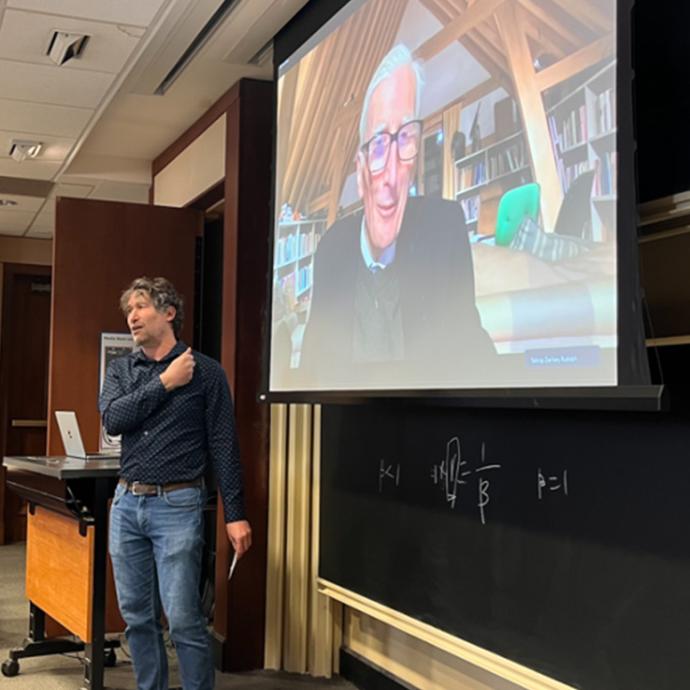Editor’s note: A version of this Q&A was first published Nov. 2 by the University of Chicago Magazine. Longtime “Jeopardy!” host Alex Trebek died Nov. 8 at age 80 after a battle with pancreatic cancer.
For decades, Alex Trebek was an institution. The lone host of “Jeopardy!” since its revival in 1984, he became one of the most recognizable faces on television—the patriarch who helped nurture the game show’s following into a sort of extended family.
“If you talk to people about ‘Jeopardy!’—everybody, they just light up,” said University of Chicago alum Claire McNear, AB’11. “Everybody’s got a ‘Jeopardy!’ story.”
A staff writer at The Ringer, McNear is the author of Answers in the Form of Questions: A Definitive History and Insider’s Guide to “Jeopardy!” Publishing Nov. 10, the book offers new insights on the beloved game show, from the story of a buzzer strategy guru to an account of her own humbling experience taking the test for aspiring contestants.
While researching her book, McNear discovered a delightful—and fitting—piece of trivia: In 1999, UChicago hosted “Jeopardy!” College Championship auditions on campus. From an undergraduate population of fewer than 4,000 students, around 2,500 showed up. “They ran out of test sheets,” McNear said.
So, the fact that a “Jeopardy!” devotee like McNear found herself in Hyde Park was perhaps no accident.
“It’s about celebrating people doing this weird thing that they love and they’re good at,” she said of the show. “One of the great things about ‘Jeopardy!’—and one of the things about it that reminds me of UChicago a little bit—is that it’s just a lovely place for dorks.”
In the following Q&A, McNear discusses what makes “Jeopardy!” such an enduring phenomenon, why she considers the game a sport, and why UChicago librarian Emma Boettcher is still an underappreciated champion. Her comments have been edited and condensed.
What has given “Jeopardy!” such enduring appeal?
I think it’s both that it is a really good game—you get through 61 questions in a game of “Jeopardy!”—but that it also has a sense of humor about itself. The writers want to have fun with it, and of course, Alex Trebek wants to have fun with it.
What do you think will happen to the show without Alex Trebek?
[Note: In a piece for The Ringer published shortly after his death, McNear describes Trebek as “a singular talent and a singular delight.” She recalls some of the conversations they had while she researched her book, including Trebek’s hopes for his successor to be able to make the show their own.]
One of the beautiful things about “Jeopardy!” is it doesn’t change. If you watch an episode filmed a year ago versus one that was filmed 15 years ago, Trebek might have a moustache in the older one. But other than that, it’s the exact same show.
It’s not clear what will happen. “Jeopardy!” will definitely continue. Alex Trebek is the first person to say he wants it to go on after him. I think everybody has their favorite pick. I’m partial to the idea of bringing in one of the storied contestants, like a Ken Jennings or a Brad Rutter.
Trebek has also said that he thinks it will be a woman. The world of game show hosts is a very male, very white space. If they find a way to do something different, that would be phenomenal.
You’ve argued that “Jeopardy!” is a sport. Why?
People train for “Jeopardy!” in a way that I think most casual viewers don’t understand. They move all their furniture around and practice standing at a podium. James Holzhauer would wear uncomfortable dress shoes. It’s always really cold in the studio, so people chill their homes to 52 degrees. It’s a mental competition, but a physical one too.
Advanced statistics are currently going mainstream on “Jeopardy!”. If you look at people like James Holzhauer or UChicago’s own (user experience librarian) Emma Boettcher, the way they play the game says so much about the way people study it now—figuring out the exact place where a Daily Double probably is, or the exact amount you should wager in Final Jeopardy!, or the exact subjects that you should study if you have a month until you tape.
What separates the best contestants from others?
You can ignore all the other pieces of James Holzhauer’s strategy and look at the fact that he was almost always right. He averaged one wrong answer per game. He just knows so much.
But then, to get back to the sports part of this, there’s the buzzer. People practice to get their buzzer timing just right. The truth is you never really know if you have it until you’re up there on the stage playing.












 —Prof. Chuan He
—Prof. Chuan He
